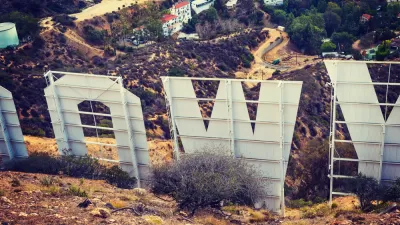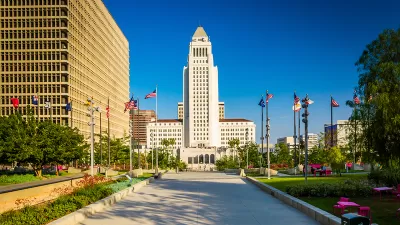The soul of planning in Los Angeles will be up for vote in the citywide election that will occur on the same day as the U.S. presidential election.
Josh Stephens provides a thorough examination of the Neighborhood Integrity Initiative, the controversial Los Angeles ballot initiative scheduled for citywide vote in November 2016. According to Stephens, the initiative "would upend Los Angeles’ approach to both project approvals and long-range planning."
"Among other provisions, the initiative would effectively place a two-year moratorium on all development that does not conform to adopted plans. It calls for the city to update its Community Plans — of which there are 37 — and forbids the City Council from granting plan amendments, which supporters of the initiative derisively refer to as 'spot zoning,' to nonconforming projects," adds Stephens.
The article includes a lot more specifics about the specific measures proposed by the initiative, as well as sharing opinions and insight about the ballot initiative from civic leaders on both sides of the issue.
Included among the many interviews Stephens conducted for the article is leadership from the Coalition to Preserve L.A. (CPLA), the group behind the initiative. Here, Stephens sums up the agenda of the initiative:
CPLA hope for the initiative to bring predictability to the city’s development process and even help combat the city’s notorious shortage of affordable and workforce housing. They say that the current system invites developers to pressure the city to approve larger and more luxurious — and therefore more profitable — projects. If developers know that a parcel is zoned only for a certain type of property, developers will avoid the lengthy negotiation process in favor of simply adhering to statute. (The initiative would not affect ministerial approvals such as variances.)
Stephens casts a wide net in setting the stage for a political debate about planning that is perhaps without precedent in Los Angeles, and without peer around the country right now. This will be an issue to watch for planners all over the country next November, perhaps right behind the presidential election itself. Consider this a referendum on the traditional mechanisms of planning, as well as a battle for the future of the practice.
FULL STORY: Ballot Initiative Takes Aim at Planning in Los Angeles

Alabama: Trump Terminates Settlements for Black Communities Harmed By Raw Sewage
Trump deemed the landmark civil rights agreement “illegal DEI and environmental justice policy.”

Study: Maui’s Plan to Convert Vacation Rentals to Long-Term Housing Could Cause Nearly $1 Billion Economic Loss
The plan would reduce visitor accommodation by 25% resulting in 1,900 jobs lost.

Planetizen Federal Action Tracker
A weekly monitor of how Trump’s orders and actions are impacting planners and planning in America.

Wind Energy on the Rise Despite Federal Policy Reversal
The Trump administration is revoking federal support for renewable energy, but demand for new projects continues unabated.

Passengers Flock to Caltrain After Electrification
The new electric trains are running faster and more reliably, leading to strong ridership growth on the Bay Area rail system.

Texas Churches Rally Behind ‘Yes in God’s Back Yard’ Legislation
Religious leaders want the state to reduce zoning regulations to streamline leasing church-owned land to housing developers.
Urban Design for Planners 1: Software Tools
This six-course series explores essential urban design concepts using open source software and equips planners with the tools they need to participate fully in the urban design process.
Planning for Universal Design
Learn the tools for implementing Universal Design in planning regulations.
Caltrans
Smith Gee Studio
Institute for Housing and Urban Development Studies (IHS)
City of Grandview
Harvard GSD Executive Education
Toledo-Lucas County Plan Commissions
Salt Lake City
NYU Wagner Graduate School of Public Service




























